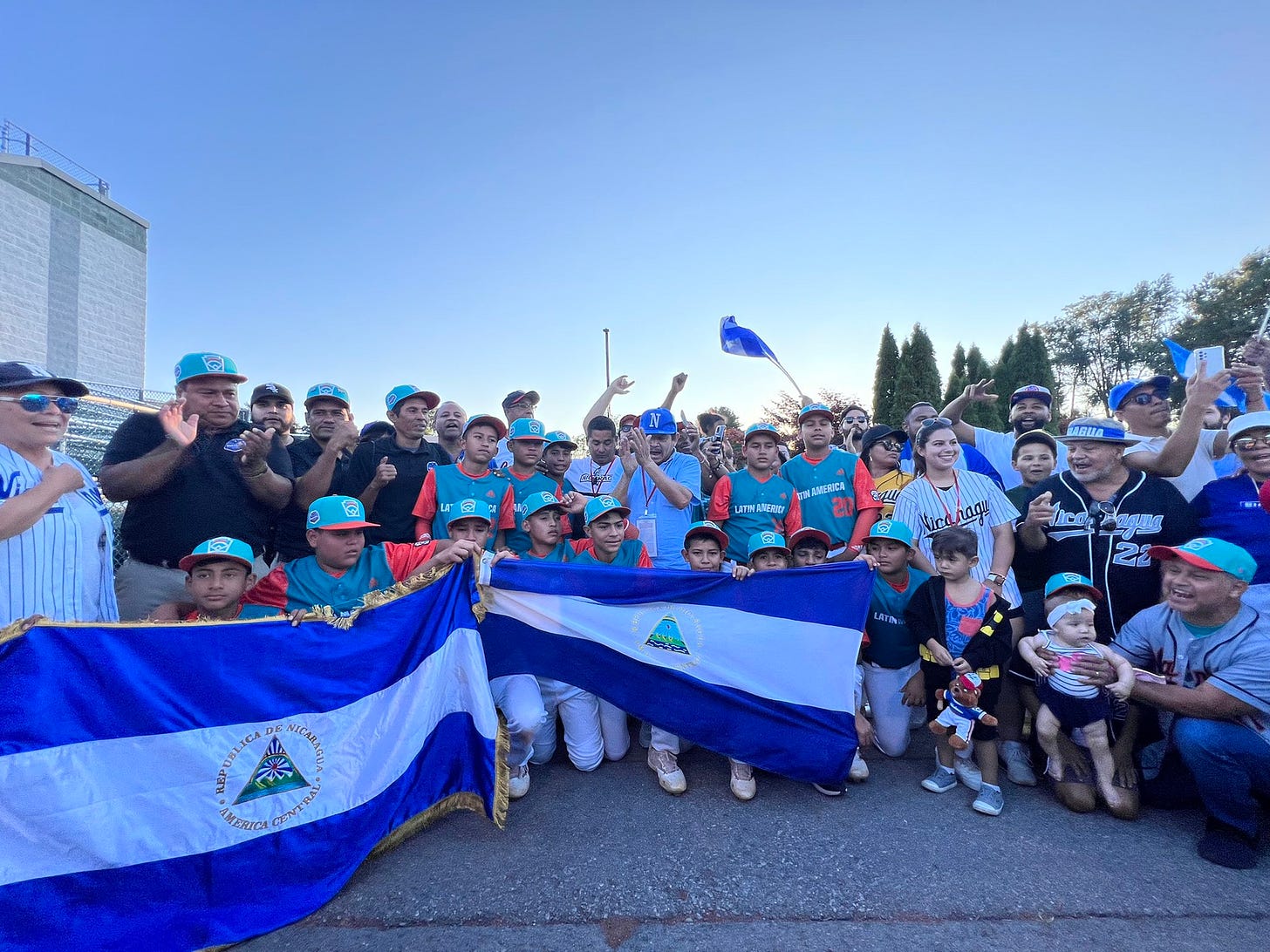Only One Parent Could Attend the LLWS. Hundreds of Others Came in Their Place.
The incredible story of the Nicaraguan team in the Little League World Series.
If you sat in the stands at Williamsport, Pa.., last week you wouldn’t have heard the typical mid-baseball game chatter. Instead, you would have heard singing.
“¡Nicaragüense por gracia de Dios!”
“I’m Nicaraguan, thanks to God.”
There were about 80 people singing on the first day, over 100 the next, and it just kept growing. They came from New York, Virginia, Maryland. One man flew in overnight from Las Vegas; he didn’t want to miss it. They brought along their own kids, or their friends, or their partners who were born all over the world. Together, they cheered for the underdog team from a small country in Central America, appearing in just their third Little League World Series ever.
Other teams have large cheering sections, populated by parents, grandparents, cousins, and siblings. Families travel from all over the world to watch their boys play in the Little League World Series. It’s a bucket list moment, a family portrait that will live on the living room photo wall for eternity. But due to visa issues with the Nicaraguan government, most of the parents were denied the chance to travel with their sons to Williamsport.
From the entire team, only one father could make the trip.
When Nicaraguan-Americans across the U.S. heard about what had happened, they mobilized. They hopped in cars and planes, booked hotels, and bought tickets. They brought noisemakers and flags, passing them out around the stadium. Nothing was planned, and the pilgrimage to Williamsport wasn’t coordinated. There wasn’t a Facebook group or Twitter call-to-action. This was just a mass of like-minded people with the same goal: make this team think they are the most special in the world.
“When I found out that the kids were going to be here…and only one parent was coming, I was like, ‘I have to go,’” said Yessenia Briceno, who drove four hours from Queens, NY, and met her parents in Williamsport. “I’m a teacher, so I knew I had to support them. These are kids. They need to feel like people are there for them.”

Arturo Lacayo grew up in Nicaragua and came to the United States for college. He’s an entrepreneur now and owns a business in North Bethesda, Md. When he read about the team in Nicaraguan papers, he packed up his car and drove with his two children to Williamsport. “These kids that come from really humble means to make it this far, it’s just been something that’s swept up all the Nicaraguan-America community,” he told Religion of Sports.
The team got swept up in it, too. “This country is behind them,” manager Marlon Chávez told the Williamsport Sun-Gazette. “They are playing for their country.”
When Briceno and Lacayo got to Williamsport, they didn’t know if anybody else would be there. But they sought each other out in the stadium, quickly forming a community. “Everyone just got swept up in it,” said Lacayo. “I didn’t know anybody there. Now, I have all their phone numbers.”
After an opening game loss, the Nicaraguan team started to rally. They upset Puerto Rico and a heavyweight Japan squad. Each game, the Nicaraguan section grew larger. Other spectators, who were there to cheer on different teams, were soon asking if they could join the Nicaraguan section, too. They were greeted warmly and taught the songs. Lacayo said that an ESPN reporter covering the tournament walked up to the group once and declared, “You guys are by far the loudest fanbase.”
“Nicaraguans are very friendly,” said Lacayo. “We’re hospitable. We’re loud…it’s in our nature.”
On the field, the team fought to the quarterfinals, where they were eliminated by Curaçao on Wednesday. “When they lost, we said, ‘Let’s go and wait for them,’” Briceno told ROS. So, all the fans waited outside the stadium to greet the team, who emerged from a tunnel crestfallen after the defeat. The fans cheered and sang. Kids asked the players for autographs. They took pictures. Fans told the players, “Thank you for connecting the Nicaraguan-American community.”
“It’s not about losing or winning,” Briceno said. “They were the underdogs in this competition, and they did a great job. Yes, they did not win this game, but they fought until the very end. It’s about bringing out the best in them and letting them know that we are always going to be with them.”
As the fans return to their homes around the country, they remain in touch. “We’re already trying to plan,” Lacayo said. “‘If we make it next year, what can we do to be more organized?’”
“It’s about staying together as a community now that we’ve found each other,” Briceno said. “And it’s about continuing to support and promote sports in Nicaragua. It’s something that, for many reasons, doesn’t happen very often. Kids need that opportunity to succeed in something that’s not just academic, like sports. Sports are fundamental. So I will be there continuing to support—not just the baseball team but any team from Nicaragua.”
That’s a sentiment that can cause anybody, no matter their nationality, to stand up in their seat and start to sing.
🎺 You’ve seen the video of New York Mets closer Edwin Diaz running out to the mound to the song “Narco”? Now learn the story behind it.
🧑🍳 Yes, Chef? Jason Gay makes the case: Is ‘The Bear’ actually a show about sports?
🏎️ F1 is booming in the States. But when can American fans expect to have a driver to call all their own? Michael Baumann of The Ringer investigates.
🥺 When a Little Leaguer hit his first ever home run, he wanted to give the ball to a very special person. You won’t be able to watch this video without crying.









